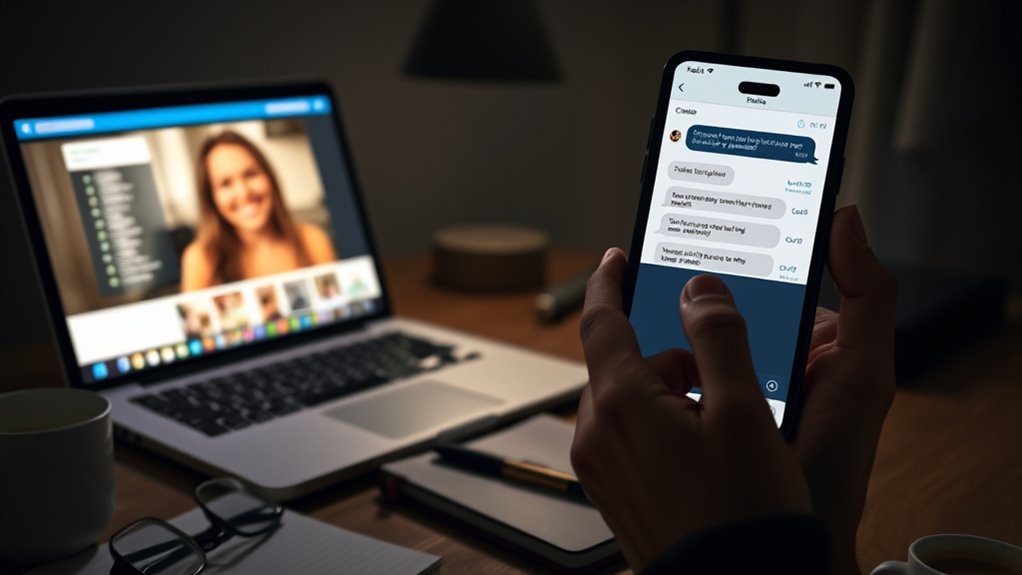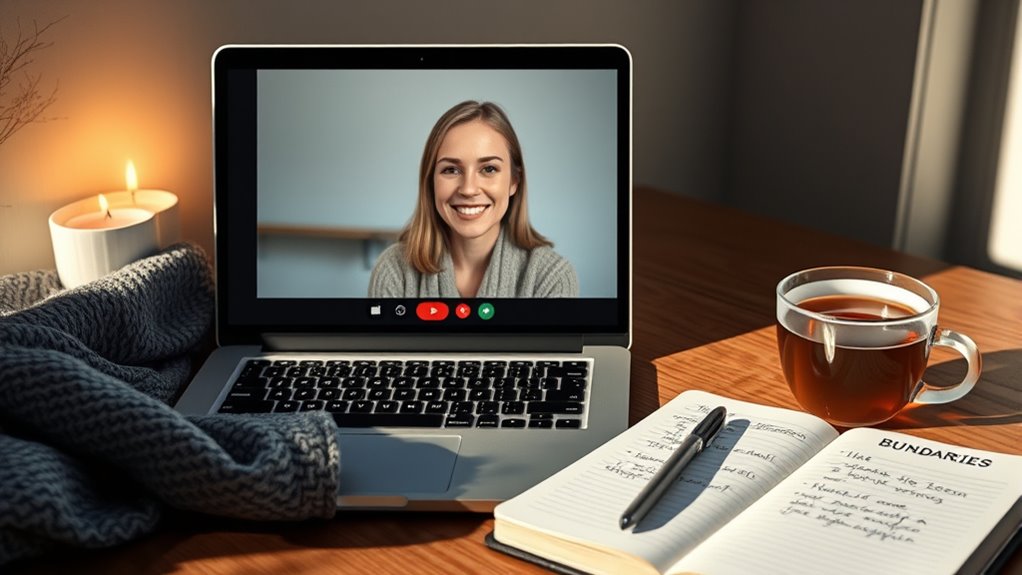When dating online with BPD, it’s vital to set clear boundaries, recognize red flags like inconsistent behavior, and prioritize your emotional safety. Be honest about your needs, use privacy controls, and take breaks when overwhelmed. Pay attention to red flags such as evasiveness or dishonesty, and trust your instincts. Building support networks and practicing effective communication will help you stay safe and maintain healthy relationships. Keep exploring ways to protect yourself as you navigate online dating more confidently.
Key Takeaways
- Clearly define and communicate your personal boundaries early to protect emotional well-being.
- Watch for red flags like inconsistent behavior, evasiveness, or incomplete profiles to ensure safety.
- Use privacy settings and control shared information to maintain your security online.
- Practice mindfulness and grounding techniques to manage impulsive reactions during emotionally charged interactions.
- Seek support from trusted friends or support groups to navigate online dating with BPD safely.
Understanding BPD and Its Impact on Online Interactions

Understanding BPD (Borderline Personality Disorder) is essential to grasp how it influences online interactions, especially in the context of dating. People with BPD often experience emotional instability, impulsivity, and difficulty maintaining relationships. These traits can lead to heightened impulsiveness and compulsive online behaviors, such as frequent social media or dating app use. The severity of BPD symptoms correlates with increased internet addiction, as many turn to online platforms for reassurance, distraction, or to manage emotional distress. Online dating becomes a common outlet, but it also amplifies challenges like emotional dysregulation, fears of abandonment, and impulsive reactions. These factors can complicate digital interactions, making it vital to understand how BPD shapes online social dynamics and the potential risks involved. 13.1% of study participants screened positively for BPD, highlighting the importance of awareness and boundary-setting in online dating contexts. Additionally, understanding appliance safety and compatibility can help prevent misunderstandings or issues when engaging with various online platforms or services related to digital interactions.
Recognizing the Risks and Red Flags in Digital Dating Environments

You need to watch for inconsistent behavior or sudden changes in your online partner’s stories, which can signal instability. Lack of transparency or evasiveness about personal details often points to deeper issues or manipulation. Recognizing these red flags early helps protect you from potential harm and emotional distress. Additionally, the difficulty in verifying someone’s identity online can increase the risk of deception and misrepresentation. Being aware of trustworthiness indicators can help you better assess the authenticity of your online connections. Developing attention to detail skills enables you to notice subtle inconsistencies that may indicate dishonesty or instability. Incorporating knowledge about projector technology can help you better understand visual cues and interpret digital cues more accurately, which is useful in assessing authenticity. Understanding relationship dynamics can provide further insight into potential manipulative behaviors, allowing you to navigate online interactions more safely. Awareness of online exfoliation practices can also help you identify superficial or deceptive behaviors that might mask underlying issues.
Spotting Inconsistent Behavior
Spotting inconsistent behavior in online dating requires paying close attention to patterns that may signal emotional instability or manipulation. You might notice rapid idealization, where someone quickly elevates you or the relationship, creating an intense early connection. Conversations may escalate swiftly, becoming overly personal or emotionally charged. Watch for emotional lability—mood swings or unpredictable responses that are difficult to manage digitally. They may demand constant reassurance, messaging or calling frequently, or show a strong fear of rejection that triggers erratic actions. Inconsistent communication, such as mixed signals or sudden withdrawal, can also be red flags. These behaviors often indicate underlying insecurities or emotional dysregulation. Recognizing these signs early helps you set boundaries and protect yourself from potential manipulation or emotional harm. Understanding BPD traits can further help you interpret these behaviors and respond appropriately. Additionally, being aware of retail hours and online service availability can help you plan your interactions to maintain your safety and well-being. Being attentive to wall organization and how someone manages their digital communication can offer insights into their emotional state and stability. Developing a clear understanding of goal tracking and your personal limits ensures you stay aligned with your safety priorities. Incorporating knowledge about My Dogs’ Names and other personal boundaries can also assist in maintaining your emotional health while navigating complex online relationships.
Identifying Lack of Transparency
Lack of transparency in online dating profiles often signals potential red flags. If you notice incomplete or vague profiles that skip details about interests, hobbies, or past experiences, proceed cautiously. Overly flattering or generic descriptions that seem too perfect may also indicate unrealistic self-presentation or dishonesty. Inconsistent photos or conflicting information suggest someone is hiding their true identity or multiple personas. Profiles focusing on intense or dramatic language can reveal emotional instability. Additionally, the absence of real-life connections or friends listed might point to social isolation. Recognizing these signs helps you identify when someone isn’t being fully honest. Staying alert to these red flags can protect you from potential manipulation or harm in digital dating environments. Being aware of these signs can help you better assess the trustworthiness of a new connection. Moreover, understanding the role of automation in business can shed light on how some profiles might be generated or managed through automated tools, raising further suspicion. Also, incomplete profile details might indicate the profile is not genuine or is being managed by an automated system. Developing an awareness of professional or financial deception tactics can further enhance your ability to detect fraudulent profiles and avoid scams. Recognizing signs of profile automation can also help differentiate between genuine users and fake profiles designed to deceive. It’s important to stay informed about common digital deception tactics to protect yourself effectively.
Establishing Personal Boundaries for Healthy Online Relationships

Setting clear limits helps safeguard your emotional well-being and builds trust. Be honest about what you’re comfortable sharing and what you need from the relationship. Enforcing these boundaries consistently ensures respect and keeps interactions healthy. A grocery savings strategy can also support your overall well-being by reducing financial stress and allowing you to focus on building trust in your online relationship. Practicing stillness can help you develop the mental clarity needed to recognize when your boundaries are being tested or crossed. Developing mental clarity can be particularly beneficial in detecting subtle signs that your boundaries are being challenged or disrespected. Being aware of the calming effect of a cozy bedroom environment can also promote emotional stability and help you maintain firm boundaries during stressful interactions. Since seasonal variations can influence your mood and energy levels, being aware of these changes can help you adjust your boundaries accordingly. Online dating is more popular among younger adults, so establishing boundaries early can help navigate different expectations and experiences effectively.
Define Your Limits Clearly
Establishing clear personal boundaries is essential for maintaining healthy online relationships, especially when steering through the complexities of dating with BPD. When you define your limits, you set expectations that protect your emotional well-being and prevent misunderstandings. Be specific about what behaviors are acceptable and what aren’t, and communicate these boundaries confidently. This clarity helps both you and your partner stay aligned. To make this easier, consider:
- Clearly stating your preferred communication methods and frequency
- Deciding what personal information or images you’re comfortable sharing
- Establishing rules for tagging or posting about each other online
- Research shows that most Americans consider setting personal boundaries very important for healthy relationships, which can empower you to maintain control over your online interactions.
- Understanding effective boundary-setting techniques can further support your ability to maintain safe and respectful online connections.
Communicate Expectations Honestly
Open and honest communication is essential for creating healthy online relationships, especially when you have BPD. Being clear about your expectations helps prevent misunderstandings and reduces anxiety. Share your boundaries and needs openly, which builds trust and fosters a genuine connection. It’s important to be honest about your mental health, including BPD, so your partner understands your perspective. Online platforms offer a safe space to communicate your intentions early on, allowing both of you to gauge compatibility. Remember, transparency about what you want and need encourages mutual respect. By setting the tone with honesty, you create a foundation of trust that supports emotional safety and helps navigate the complexities of online dating with BPD. According to recent statistics, many users find that upfront communication significantly reduces the risk of deception and misaligned expectations, making online relationships more stable and fulfilling. Additionally, understanding the safety features of your online dating platform can help you set boundaries and stay protected during your interactions. Establishing clear boundaries and expectations from the outset can further enhance your comfort and security in the online dating environment. Incorporating emotional regulation techniques can also help manage the highs and lows that may arise during online interactions, fostering healthier connections. Developing self-awareness about your emotional triggers can be especially beneficial in maintaining healthy boundaries and responses. Being aware of platform support hours can ensure you seek help promptly if issues arise during your online interactions.
Recognize and Enforce Boundaries
Recognizing and enforcing your personal boundaries is essential for maintaining a healthy online relationship, especially when steering through the complexities of BPD. Setting clear limits protects your emotional well-being and helps prevent burnout. Understanding your boundaries allows you to share only what feels safe and maintain privacy. Digital boundaries, like controlling shared content and privacy settings, keep your information secure. Trust is crucial, but it’s important to balance openness with private space. Expanding social circles through online platforms offers the opportunity to meet diverse individuals, but it also underscores the importance of setting boundaries to ensure safety and comfort. Know your comfort level with sharing personal information and stick to it. Use privacy settings to control who sees your profile and content. Watch for boundary violations, such as intrusive messages or pressure to share more than you’re comfortable with. Being aware of air quality can also help you maintain a healthy environment, both physically and emotionally, by reducing stress and promoting well-being.
Techniques for Managing Emotions During Online Encounters

Managing emotions during online encounters can be challenging, especially when misinterpretations or delays trigger intense reactions. You might overreact to a delayed message or interpret silence as rejection, leading to emotional upheaval. To stay grounded, try mindfulness techniques—pause before replying to emotionally charged messages, giving yourself time to process. Grounding exercises can help manage impulses to act out or escalate conflicts. Remind yourself that online interactions often don’t reflect reality, which can ease anxiety. Journaling feelings before engaging helps clarify your emotions and reduce impulsivity. Taking short breaks from conversations allows you to regain perspective. These techniques help you stay balanced, prevent emotional spirals, and foster healthier interactions—crucial steps in steering through online dating safely with BPD.
Prioritizing Safety and Privacy When Meeting New People

Prioritizing safety and privacy is essential when meeting new people online, especially with the heightened risks involved. You need to be cautious to protect yourself from scams, fraud, and potential threats. Start by using separate emails and phone numbers for dating sites, and avoid sharing detailed personal info like your address or workplace. Be wary of profiles with inconsistencies or those that rush emotional intimacy. Turn off location-sharing features and stick to in-app messaging until you’re confident in your match. Always verify profile details through reverse image searches and check against sex offender registries if needed. Before meeting in person, share your plans with a trusted contact and choose public spaces. Staying alert and cautious helps you stay safe and maintain control of your privacy.
Strategies for Building Mutual Respect and Clear Communication

Building mutual respect and clear communication with someone who has BPD requires intentional effort and compassion. Start by practicing empathy—validate their feelings with understanding, using feeling words like “I see you’re angry,” to affirm their emotions without judgment. Reflect their emotions back to them instead of interpreting or labeling, which helps foster respect. Use honest, objective language to clarify situations and define boundaries clearly, explaining what behaviors are acceptable and the consequences of crossing those limits. Practice active listening by attentively hearing their words and paraphrasing to confirm understanding. Encourage open dialogue about feelings and needs, avoiding yes/no answers, to prevent misunderstandings. Consistently respectful, empathetic communication creates a supportive environment that reduces conflict and strengthens mutual respect.
Coping Skills to Handle Challenges and Prevent Triggers

Since impulsivity and compulsive behaviors are common in individuals with BPD, developing effective coping skills is essential to handle online dating challenges and prevent triggers. Recognizing patterns of impulsive online activity helps you set boundaries and avoid emotional overwhelm. Mindfulness, structured routines, and self-awareness are key tools to manage urges, reduce reactive behaviors, and stay grounded.
- Practice deep breathing or grounding exercises whenever you feel impulsive or overwhelmed.
- Set specific time limits for online dating activity and stick to them to prevent burnout.
- Use assertiveness to communicate boundaries clearly and avoid oversharing or rushing into intimacy.
These skills help you stay in control, protect your emotional well-being, and create safer online dating experiences.
Leveraging Support Networks for Ongoing Emotional Well-Being

Leveraging support networks plays a crucial role in maintaining ongoing emotional well-being for individuals with BPD engaged in online dating. These networks provide safe spaces to share experiences, reduce feelings of isolation, and develop essential skills. Whether through peer groups, online communities, or family programs, you gain access to collective coping strategies and feedback. Active participation helps you practice boundary-setting and improve communication. For example, online communities enable consistent support outside scheduled meetings, while moderated spaces ensure respectful, safe interactions. Additionally, programs like Family Connections™ teach skills for managing emotions and supporting loved ones. Over time, engaging in these networks fosters empathy, radical acceptance, and resilience, helping you navigate online dating with more confidence and emotional stability.
| Support Network Type | Key Benefit |
|---|---|
| Peer Support Groups | Share experiences, reduce isolation |
| Online Communities | Accessible, real-time connection |
| Family Programs | Improve communication, manage emotions |
| Mutual Coaching | Practice feedback, empathy |
| Moderated Spaces | Safe, respectful interactions |
Frequently Asked Questions
How Can I Recognize My Own Online Dating Patterns That May Be Harmful?
You can recognize your harmful online dating patterns by paying attention to your behaviors and feelings. Notice if you’re messaging impulsively, rushing into deep emotional connections, or struggling to respect boundaries. Watch for signs like seeking constant validation, avoiding conflicts, or feeling overwhelmed by interactions. Reflect on whether these patterns leave you feeling more anxious or dependent. Being mindful of these signs helps you identify and adjust unhealthy habits.
What Are Effective Ways to Manage Jealousy During Online Interactions?
Jealousy can feel like a wildfire, spreading quickly if left unchecked. To manage it, practice open, honest communication with your partner, and set clear boundaries to create a safe space. Use mindfulness techniques to stay grounded, and limit social media monitoring to avoid unnecessary triggers. Building trust through positive reinforcement and reflecting on your feelings helps keep jealousy in check, fostering healthier and more secure connections.
How Do I Handle Rejection or Ghosting Healthily Online?
When you face rejection or ghosting online, remember it’s not a reflection of your worth. Take a step back and avoid overanalyzing, which can heighten emotional pain. Practice self-care by engaging in activities that boost your mood, and set boundaries to limit your exposure to repeated rejection. Reach out to friends or a support system for reassurance, and remind yourself that healthy connections take time and patience.
What Signs Indicate I Should Take a Break From Online Dating?
You should consider taking a break from online dating when you notice persistent emotional exhaustion, like feeling drained or overwhelmed after interactions. If you’re experiencing low self-esteem, confusion about your goals, or repeatedly attracting incompatible matches, it’s a sign to pause. Physical symptoms such as fatigue or sleep issues, along with social withdrawal or heightened anxiety, also indicate it’s time to step back and focus on your mental well-being.
How Can I Balance Online Dating With My Mental Health Needs?
Balancing boundaries and benefits can be challenging, but you’re capable of managing your mental health while dating online. You’ll want to set clear boundaries, communicate your needs, and practice self-care consistently. Taking regular breaks helps prevent overwhelm, and leaning on your support system gives you reassurance. By staying aware of your emotional state and practicing mindfulness, you can foster fulfilling, safe connections without sacrificing your well-being.
Conclusion
Remember, exploring online dating with BPD isn’t just about setting boundaries—it’s about trusting your instincts and staying aware. Sometimes, the right connection appears unexpectedly, like a gentle reminder that safety and respect should always come first. By staying mindful of your needs and memories of past experiences, you can find meaningful connections while protecting your well-being. After all, the right person will respect your journey, just as you’re learning to honor your own boundaries.









